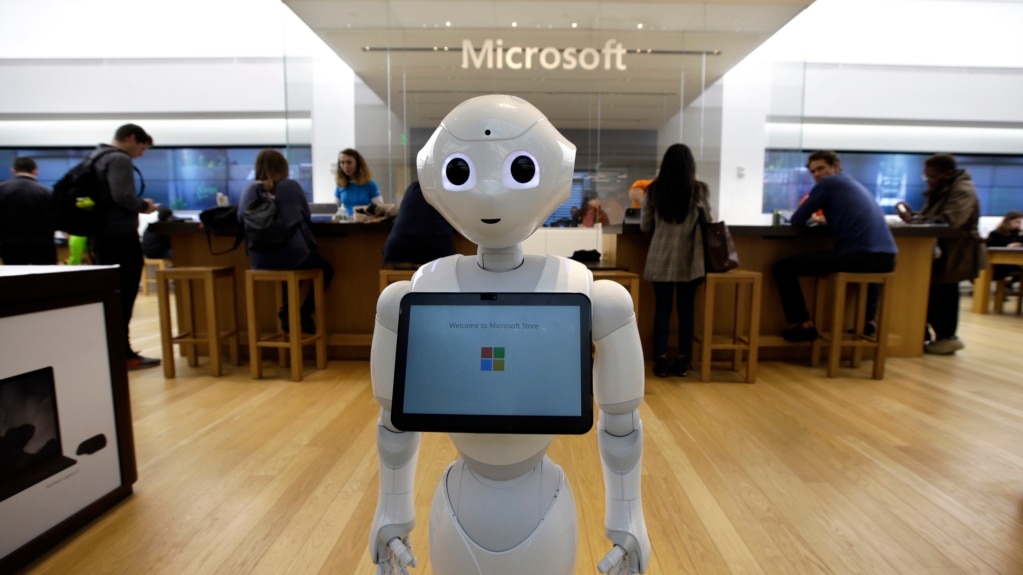American technology company Microsoft has announced a new, multibillion-dollar investment in artificial intelligence (AI) developer OpenAI.
The deal marks the latest deepening of ties between the two companies. Microsoft first invested in OpenAI in 2019, when it put $1 billion into the company.
Microsoft officials did not name a number for the latest investment. But people with knowledge of talks between the two companies recently told Reuters news agency the amount was at least $10 billion.
OpenAI is a research and development company centered on AI projects. The startup was launched in late 2015 by American billionaire Elon Musk and others.
On its website, OpenAI declares that it exists “to ensure that artificial general intelligence (AGI) benefits all of humanity.” The company defines AGI as “highly autonomous systems that outperform humans at economically valuable work.”
In late November, OpenAI launched a free writing tool called ChatGPT. The launch led to widespread media attention about the current possibilities involving new developments in AI.
ChatGPT is part of a new generation of machine-learning systems designed to produce many forms of human-like writing. The tool can autonomously produce complex documents in seconds. Technology experts have said such systems have the possibility to greatly change many different industries and professions.
ChatGPT is so good at writing school reports that some officials in the United States have blocked the system on school devices and networks in an effort to prevent students from cheating.
Another OpenAI product called DALL-E can produce realistic images and art from a simple description in natural language.
Basic versions of the two OpenAI products are free to the public.
As part of its partnership, Microsoft provides “supercomputing systems” to OpenAI to support the development of new AI products.
ChatGPT and DALL-E require powerful computers to operate the machine-learning models the systems use. OpenAI says the tools can produce human-like results because they have been trained on huge amounts of data. A range of materials – including digital books, online writings and other media – are fed into ChatGPT and DALL-E to permit the tools to learn complex skills.
Microsoft to expand services with AI
In a statement announcing its new investment in OpenAI, Microsoft said it will continue to deploy OpenAI’s models across many of its product lines. Specifically, Microsoft said its partnership with OpenAI will permit the company to expand offerings in its Azure OpenAI service. Azure is Microsoft’s cloud-computing service.
Microsoft said Azure OpenAI Service helps developers build new AI systems by making OpenAI’s models available to its users. Microsoft said that since 2016, it centered on efforts aimed at “building Azure into an AI supercomputer for the world.”
Rowan Curran is an expert with the market research company Forrester. He told The Associated Press he thinks it currently makes good sense for OpenAI and Microsoft to expand their relationship.
“There’s lots of ways that the models that OpenAI is building would be really appealing for Microsoft’s set of offerings,” Curran said.
For example, OpenAI models could help produce writing and images for new business presentations or create smarter word processors. The technology could also help Microsoft’s own search engine, Bing, compete more effectively with Google. AI could make Bing more user-friendly by providing search results that include more complete answers, rather than just links.
OpenAI noted in a statement that it will still be governed by its nonprofit arm and that it remains a “capped-profit” company. OpenAI did not, however, identify what limits it sets on profits.
Microsoft’s investment came days after the company confirmed it was cutting 10,000 workers, representing about 5 percent of its total workforce. The company said the reductions were linked to “macroeconomic conditions” and changing customer needs.
I’m Bryan Lynn.
The Associated Press, Reuters and Microsoft reported on this story. Bryan Lynn adapted the reports for VOA Learning English.

